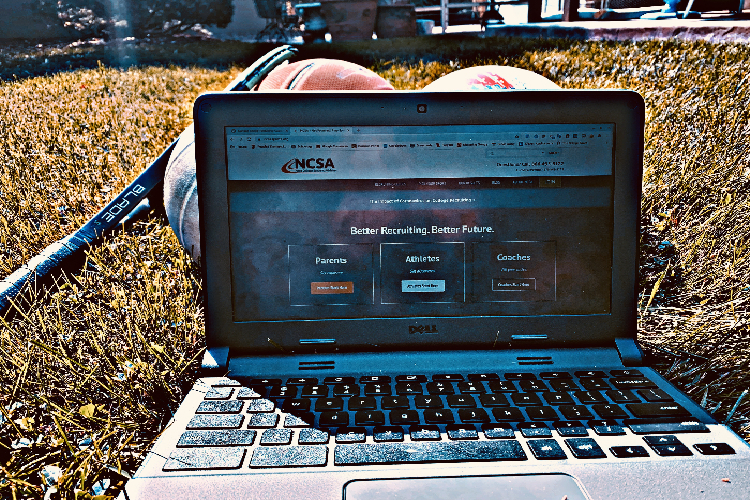
Recruiting looks a bit different these days. photo by Grace Leonard
High school athletes’ recruitment processes change due to the global pandemic.
High school athletes throughout the United States experienced gut-wrenching pain as they were told their seasons were canceled in the spring of 2020. The students that dedicated blood, sweat, and tears to the sport they had a fierce passion for did not know how to deal with the news. The pandemic had already ruined their season that they had been waiting all year for, but how was the virus going to affect their future athletic dreams to play in college? The process of recruitment was never easy, but COVID has made players’ ambitions much harder to reach.
Players and coaches have had to alter their strategies since the pandemic when it comes to recruiting. Before the pandemic heavily impacted the United States, the recruiting process was drastically different; one example of this was that players and coaches were able to travel. This allowed coaches to attend players’ games or competitions of athletes they were interested in. Likewise, players were able to attend identification (ID) camps or training provided by colleges they were curious about attending. ID camps are an important part of recruiting as they provide aspiring athletes with a snapshot of the collegiate sport they would be playing. While attending the ID camp, players are in a competitive and challenging environment. Opportunities are provided for eager players to be seen by D1, D2, and D3 coaches and create connections that help their future. After the camp, the student athlete has a better perspective of the coaching, facilities, and their future as a student athlete. The player would also understand the academics, student life, and social atmosphere of the overall campus. The coaches benefit from the relationships and communication they develop at ID camps. An important factor for coaches is to be able to watch players in person. Coronavirus has made this essential step in recruiting extremely problematic.
COVID-19 continued to spread and so did the players’ and coaches’ unsettled feelings about the future process of recruiting. Doubts went through players’ minds if there could be a decline in scholarships and communication with colleges. Lauren Reid, a dedicated soccer player who has envisioned her soccer career continuing in college, stated, “The virus made me step back and think, ‘It’s going to be a lot harder to be recruited, so do you want to play in college?’’’ Like most players, she questioned whether or not her collegiate goals were realistic and worth the time. Reid has been in the recruiting process since pre-pandemic; she explained that when the pandemic began, the recruiting world was instantly changed. Colleges’ interests decreased since there was not the same availability to watch games in person. Head coach of the women’s soccer program at the University of Denver, Jeff Hooker, shared similar concerns. He added that the laws that have been set into place forbidding coaches from watching in person have made it difficult to not have hesitations about players. A state of concern for coaches has been initiated as a result of not knowing if the player’s skills have improved or decreased over the past excruciating months. The limitations due to the pandemic have lessened opportunities. Hooker explained, “You have coaches that can’t recruit and players that are losing out on possible opportunities to get scholarships and go to schools.”
Although college recruitment has decreased, there is still hope for the future of recruiting. Coaches in all divisions are continuing to look for players who work hard and are committed, aggressive, and versatile in various positions. Student athletes have had to deal with challenges throughout their life and this is no different. Coaches want a reliable player who can still show their true character even in the stress of a pandemic. It is unfair that athletes looking to play at competitive levels in college have to overcome all of these unexpected hurdles, but there have been improvements since the beginning. Online recruiting programs have upgraded. A site that many adolescent athletes use is Next College Student Athlete (NCSA). The website provides personal recruiting coaches that walk you through the steps of being recruited. The communication through NCSA is easily accessible and allows for essential steps in the recruiting process. A helpful and necessary application that is included with your profile in NCSA is an edited video. Coaches want to see how the player performs during competitions, and film is more important than ever now. The world of recruiting for high school athletes has had a decrease in opportunities, but they are not completely gone. Student athletes who strive to pursue the love for their sport at a collegiate level need to self-advocate. The effort they show to colleges is critical and the players who show devotion are more likely to be offered scholarships. There are only 460,000 NCAA student athletes, and the question is, will you be a part of this number?